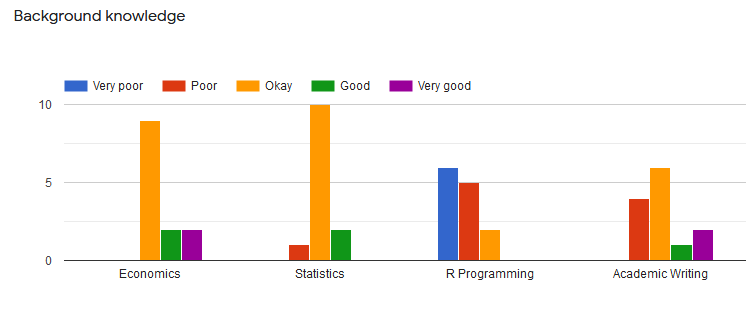Some favorite quotes (biased)
Imagine a friend of yours is taking this seminar. What would you recommend him/her?
I highly recommend the course to anyone since it will improve writing skills as well as coding.
This seminar requires a lot of patience and feels pretty long, but it's all worth it in the end. Prepare to dedicate a lot of time, especially at the beginning. The R-script assignments might seem hard and demand for great efforts, but it feels really good when you finally solve them. Following all the guidelines and announcements is crucial.
The language of numbers
| Semester | # Participants | % Female | Ø Grade |
| 2019/2020 | 9 (BA) | 66 % | 2,0 |
| 2020 | 11 (BA) / 4 (MA) | 73 % | 2,1 |
| 2020/2021 | 4 (BA) / 10 (MA) / 1 (PhD) | 40 % | 2,1 |
| 2021 | 9 (BA) / 5 (MA) | 71 % | 2,0 (one person not passed) |
Thus these average grades are not a good indicator for difficulty. Perhaps high difficulty and workload operates as a filter and only high performer remain in class.

Most students rated their background knowledge in Economics and Statistics as “okay” (so called mode), academic writing experience as mixed and R experience as limited.
Still, considering the overall good final grades we may conclude that sound statistics background is more important than prior programming. In other words, students can learn R programming within the scope of a semester.

In 2020/2021 eleven students completed the seminar whereas about 23 registered at the beginning of winter term. The dropout was about 50%. Drop-out is a serious problem for academic courses as well as for panel studies (panel attrituion). People or students decide for various reasons to no longer participate in a survey or class. — Do you wonder how these 50% of students that passed the class are different from those 50% of students who dropped out?
I don’t dare to say that my class will be the reason why you master statistics, statistical thinking about causality or programming. Perhaps students who make it to the end are high motivated, have high ability or previous knowledge about statistics and programming. Perhaps as a student you only take statistics seminars if you like the challenge. This is called self-selection and might produce serious bias in social sciences.